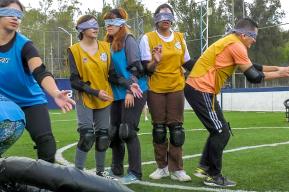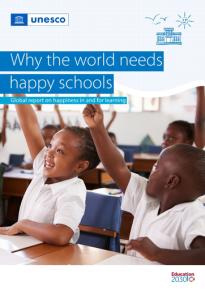News
UNESCO’s new global report puts happiness at the centre of education policy

Leveraging evidence from science, philosophy and international normative frameworks, the new global report proposes a framework of 12 high-level criteria to inspire Happy Schools projects around the world.
“Happy Schools has grown into a global movement, which is much needed in today’s troubled world,” said UNESCO’s Assistant Director General of Education, Stefania Giannini. “We need to stop the belief that achievement, excellence and rigour in schools cannot coexist with joy and relationships — it can, and indeed it must if we are to address the current crises in both learning and well-being.”
The symposium brought together a range of speakers for a dialogue in three parts: Evidence, policy and practice. The two-hour discussion featured cases and perspectives from the European Commission, the OECD, Bhutan, Portugal, Viet Nam and Bulgaria.
To kick off the first segment on evidence, renowned child psychologist and learning scientist, Professor Kathy Hirsh-Pasek, gave a keynote address outlining her research on active, playful learning and the pedagogical approaches and learning spaces that are associated with better and wider learning experiences and outcomes.
“The active, playful learning principles that are founded in the science of learning map directly onto the Happy Schools framework,” said Prof Hirsh-Pasek, highlighting the three criteria of collaborative relationships, joyful and engaging pedagogies, and empowerment as particularly salient according to the scientific literature.
Evidence-based approaches
The importance of the three principles criteria of empowerment, inclusion and trust were further underscored by a presentation of the Universal Design for Learning framework, developed by the nonprofit education research organization CAST, which applies current understandings from brain research into instructional practices.
Exploring international comparative data, Mario Piacentini, Senior Analyst at the OECD, emphasized that according to recent findings from the PISA 2022 assessment, “The primary driver of students’ life satisfaction is about whether students feel the sense of belonging to the school and social relationship they establish with their peers and their teachers alongside with the sense of safety, anxiety and their sense of confidence.”
Despite the strong – and growing – evidence base to support joyful learning environments for quality education, policy approaches have been slow to prioritize happiness in and for learning. However, the symposium highlighted the increasing international attention that the nexus of happiness, well-being and learning is receiving in policy and in practice.
From the European Commission, Anna-Maria Giannopoulou underscored, “Education is not just about academic achievement, but it’s about nurturing the whole child,” which is instantiated in the Council Recommendation on Pathways to School Success and forthcoming guidelines on well-being at school, developed by two expert working groups of the European Education Area.
Reflecting on her country’s recent PISA results, Deputy-Minister of Education and Science in Bulgaria Natalia Miteva presented how “alongside learning outcomes, we want to be able to support facets of well-being for each and every student,” citing that cyber-bullying has doubled between 2022-2023 and that the number one reason students miss school is that they feel bored. Given these challenges, Ms Miteva said Bulgaria “would be very happy for Bulgaria to be one of UNESCO’s new countries that pilots and implements the framework at the national level and look forward to showcasing evidence of impact in the future.”
Bhutan is a pioneer country for prioritizing happiness in national policy, known for its Gross National Happiness index. The symposium featured a presentation from Ms Tashi Lhamo from the Ministry of Education and Skills Development, which outlined Bhutan’s Green Schools framework and teacher training programme, which translate the national government’s philosophy into education-specific initiatives.
The symposium ended with two implementation case studies of the UNESCO Happy Schools framework in practice in Portugal and Viet Nam. The Department of Education and Training of Ho Chi Minh city, which recently became a member of UNESCO’s Global Network of Learning Cities, developed a Happy Schools model for Viet Nam, which includes an implementation plan for managers, teachers, staff and students, as well as study visits.
Finally, researchers Dr Patricia Gramaxo and Dr Georg Dutschke shared their collaboration with the government of Cartaxo, a city in Portugal, which included the development of a diagnostic tool for school happiness taken by students, parents and staff to co-create happy school models that are adjusted for each region.
“Schools not only respond to the changes in society,” Borhene Chakroun, UNESCO’s Director of Division for Policies and Lifelong Learning Systems emphasized. “But they also shape the societies we want to see.”
- Watch the full symposium in English and French
- Why the world needs “Happy Schools”
- Read: Why the world needs happy schools: Global report on happiness in and for learning








